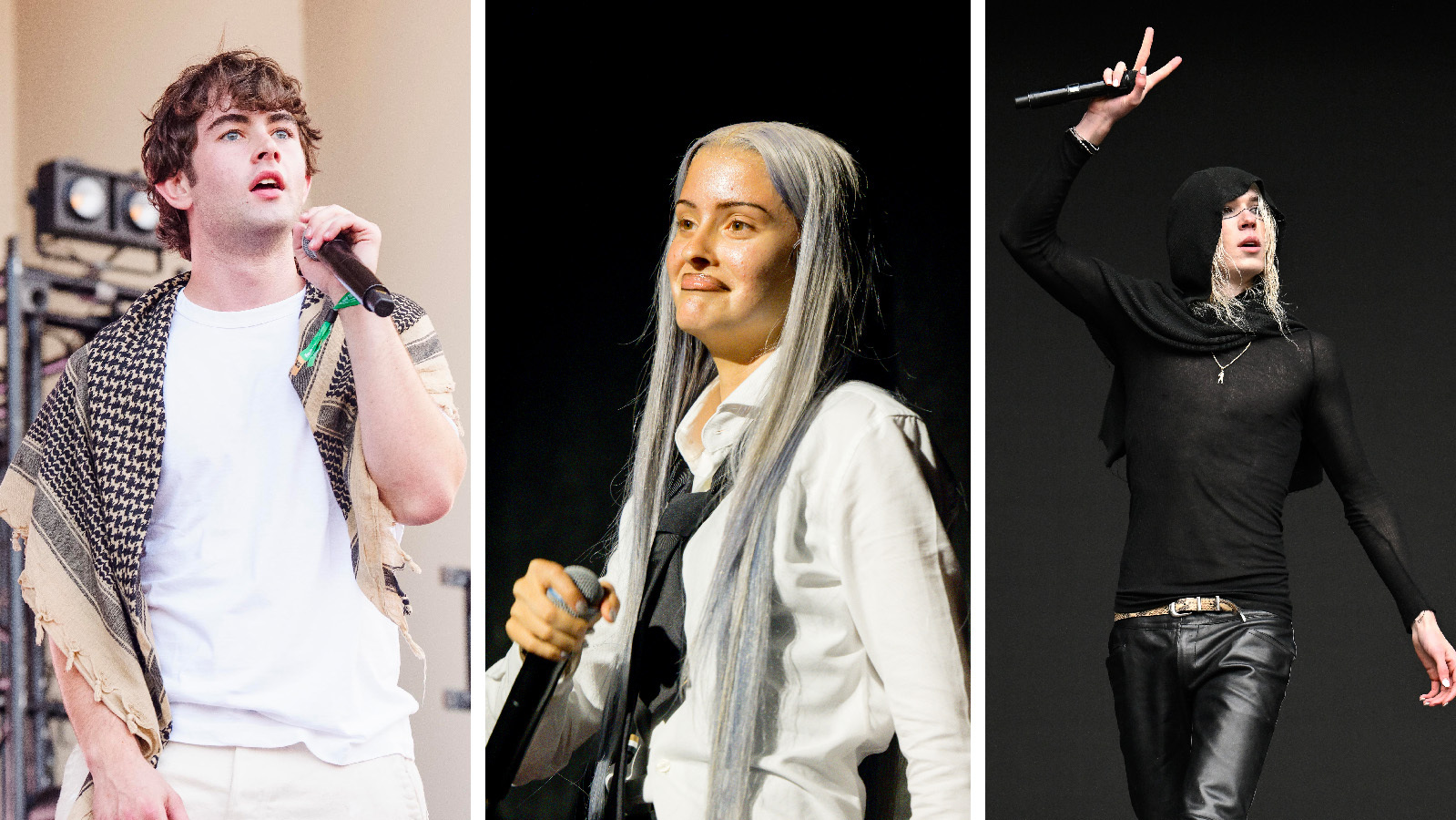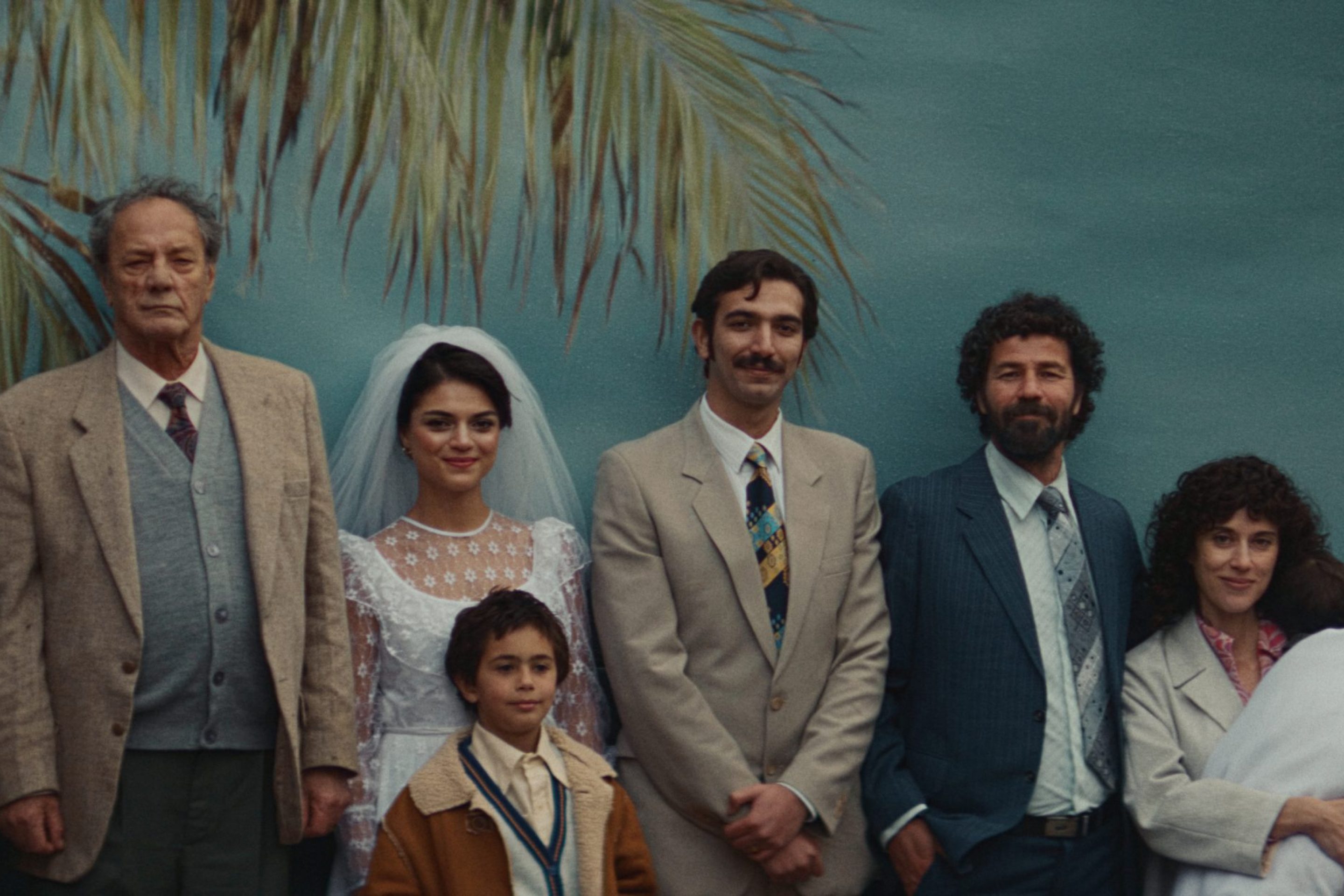If it feels like white rappers are sprouting up all around us, it's with good reason. Though they never really went away—Kreayshawn is somehow still in the news—the last year alone has brought to prominence artists such as ian, who stylizes his name in all lowercase and puts a suburban face to Atlanta trap music; 2hollis, a model-esque figure whose dance rap is appropriately runway-ready; Nettspend, a snot-nosed teenager hellbent on reminding the world that rappers have long since been the new rockstars; Jorjiana, a bashful Midwesterner who was once introduced on the controversial rap podcast No Jumper as "the most viral white girl in America"; and 1900Rugrat, a spitfire Florida native who, on his breakthrough single, unforgettably compares himself to a school shooter. But it's not the breadth of styles on offer that makes it such a hospitable time to be a white rapper. It's that being a white rapper in 2025 means no longer having to qualify your existence.
This fact alone makes the current day an anomalous period in the lifespan of rap music. White rappers are audacious by their very nature, but, historically, have largely been governed by a sense of deference—to Black artists and culture, to tradition and history, to the rigid forms of the genre. The avatar of white rap for the last two generations embodies this paradox in full: Eminem arrived as an outlandish rule-breaker, but one whose verses doubled as real-time monuments to the most orthodox ideals of rapping. Even as his music became infected with shameless pop choruses, Eminem's fealty to tradition never wavered; if anything, it only became stronger. By the mid-2010s, his verses had evolved into even denser mazes of syllables, to be traversed only by those who similarly worshiped at the altar of such dogma. In his wake, rap fans were introduced to artists like Mac Miller, whose earliest underground hits were over old beats by Q-Tip and Lord Finesse, and Machine Gun Kelly, whose first appearance on television came via MTV's Sucker Free Countdown, freestyling in what could be mistaken as fast-forward. Even Jack Harlow, the squeaky-clean pop star who bridges the gap between Eminem and the present day, has partly attributed his rapping success to his mother's invocation of Malcolm Gladwell's "10,000-hour rule." The implication—that a white rapper's effort should be readily apparent, even advertised—hardly needed to be stated.
To witness the waning power of this dynamic, we need to look back only about a month, when ian, who played rugby at Clemson before picking up rap, went viral on TikTok for his entry into XXL's Freshman Freestyle series. Of this latest crop of white rappers, ian is, if not the most popular, the most controversial. Last summer, Tyler, the Creator became the prominent voice of backlash, accusing ian, whom he described as "a regular Caucasian man," of "mocking" the Southern rappers, such as Future, to whom he is obviously indebted.
Ian's foray into the XXL freestyle canon lasts over two minutes, but it reached ubiquity on TikTok in the form of an eight-second snippet, which as a standalone piece of media might seem to confirm Tyler's suspicions. The clip features ian proudly rapping words that do not rhyme even in the slightest. "Damn, I'm feeling like 50 Cent, bitch I'm in the club," he says cheekily. "Damn, I'm on my Britney shit, oops I hit again." These bars are presented as non sequiturs, but that hedging is undercut by the fact that they are linked by references to hit singles of yore. We also shed the notion that freestyling is spontaneous long ago, so the lines likely aren't the product of ian coming up with raps off the top of his head. They are simply lines that do not match up: adjacent puzzle pieces that, by the design of the manufacturer, do not fit together. Still, when ian performed recently at Lollapalooza, the freestyle took on the form of an anthem, shouted to the heavens by an audience that, it feels worth noting, looked more or less just like him. B-Rabbit, this origin story is not.
To what do we owe this new paradigm? It might be tempting to point to Gen-Z doomerism—to say that elevating white rappers without first making them clear hurdles of rapping skill is a version of nihilism—but young people have always enjoyed thumbing their noses at the norms of previous generations. What feels more pertinent is that we now live in a time where institutions are being devalued and dismantled all around us, and rap has not been spared. Where up-and-comers two or three decades ago may have had to prove their mettle as emcees in front of luminaries such as Stretch and Bobbito or Funkmaster Flex, today's most visible rap media personalities—people like Joe Budden and DJ Akademiks—rarely if ever concern themselves with the genre's freshest faces, be it for freestyles or interviews. It wasn't that long ago that a newly famous Kodak Black was asked by Hot 97's Ebro Darden about standing trial on sexual assault charges, causing the rapper to walk off set; such confrontations are not in Darden's job description at Apple Music, where his interviews now exist to grease the skids of the streaming economy. Charlamagne tha God, who used to relish putting the screws to new rappers on The Breakfast Club, resulting in memorable back-and-forths like his one with Azealia Banks, has mostly left rap behind for a career as a political commentator.
The role of probing the backstories and skills of newly minted stars is currently being filled by streamers like Kai Cenat and Plaqueboymax, who operate in a medium prone to vapidity. Cenat's hourlong stream with Ice Spice, for instance, filmed during her controversial come-up in 2022, is a slog from start to finish, producing zero moments of frisson. Better is Plaqueboymax's Song Wars series, which replicates some of the improvisational and competitive aspects of freestyle culture, subjecting a mix of unknown, rising, and established artists to a panel of judges, helping break fringe auteurs like Xaviersobased. Still, as mediated through Twitch, the battles can have an awkward, lurching gait, and Plaqueboymax hasn't held one since April, leaning instead into MrBeast-style YouTuber content, as well as his own fledgling rap career. The popular YouTube channel On the Radar is clearly indebted to the legacy of freestyling as a bar to be cleared by any rapper worth their salt, yet it uploads dozens of new videos per week, favoring content churn over curation. Over time—once it was big enough to reel in Drake—the channel morphed from a platform that offered rappers the ability to cut through social media clutter by foregrounding their lyricism, to one that is just another spoke in the promotional wheel, a place where almost anyone can show up to flog a new single.
None of this is to say that today's white rappers are inherently worse or more problematic than their recent predecessors. If anything, Eminem aside, they might be better. Where the scope of Mac Miller's earliest music was strangled by its fidelity to convention—an admission he made when he released his sprawling, and far more rewarding, sophomore album—ian and Jorjiana carry themselves with an insouciance that can flatter their recordings. But it is to note that the terms of engagement have meaningfully changed.
Kids who argue about music online these days often invoke gatekeeping as a concept, but they live in a world where gatekeeping, as a process carried out by humans, has been marked for death. Their gatekeeper is the big one in the sky, the TikTok algorithm, which gets talked about mythically as if it's the Wizard of Oz. The appreciation on the app for the non-rhyming bit of ian's freestyle was somewhat ironic. The understanding that his rapping was not "good," per se, was clear, and plenty of people were happy to point out that it was bad. But the unceasing nature of its algorithm means that TikTok has a way of forcing its users to bend the knee to the gods of the attention economy, and as the snippet reached the peak of its life cycle, many captions and comments began to state that, actually, the freestyle had grown on them. I didn't necessarily disagree—its cadence is catchy, its goofiness charming. The saga reached its logical climax with a short skit showing ian receiving a text from his mom skeptically quoting one of its lines ("I feel like Adele") and then a follow-up instructing him to "lose my number." It has been watched nearly 11 million times—to the generator of views belongs the spoils.
The recent fervor around new music by The Clipse would tell you that punchlines are far from dead, yet the lyricism inspiring a new generation of rappers is cut from a different cloth. Ian doesn't just echo the tone of Future's vocals, but also his penchant for rapping in clipped, declarative statements. Jorjiana's nonchalant humor owes itself to the blunt comedic stylings of the Michigan rap scene, and 1900Rugrat's kaleidoscopic imagery, which he first displayed via TikTok videos branded as freestyles, is heavily influenced by Chief Keef and Gucci Mane, rappers who were deeply divisive in their time. What links the three together is that they maneuver with ease through a world that prizes the perception of authenticity. Where earlier iterations of white rappers had to assert their identities—to become the people they saw in their heads—through visible exertion, today's use social media to appear effortlessly themselves. When Tyler, the Creator became the first of ian's peers to publicly criticize his whole deal, he argued that someone like Mac Miller truly loved rap music, while ian is merely making fun of it. But that isn't quite right. It's just that Mac Miller was savvy enough to know that he had to pay respect to tradition, while ian is savvy enough to know that he doesn't.






